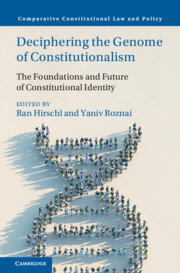Book contents
- Deciphering the Genome of Constitutionalism
- Comparative Constitutional Law and Policy
- Deciphering the Genome of Constitutionalism
- Copyright page
- Contents
- Figures
- Contributors
- Preface
- Acknowledgments
- Introduction
- Part I Foundations, Theory, and Concepts
- 1 Rousseau’s Sovereignty and the Concept of Constitutional Identity
- 2 Constitutional Identity
- 3 Constitutional Identity as Discourse
- 4 Constitutional Identity and Constitutional Revolution
- 5 The Death of Constituent Power
- 6 Constitutional Identity as a Source of Ontological Security
- 7 The Crisis in, and of, Constitutional Identity
- Part II Comparative Perspectives
- Part III American Constitutionalism and Constitutional Identity
- Part IV Emerging Trends
- Index
- References
1 - Rousseau’s Sovereignty and the Concept of Constitutional Identity
from Part I - Foundations, Theory, and Concepts
Published online by Cambridge University Press: 14 March 2024
- Deciphering the Genome of Constitutionalism
- Comparative Constitutional Law and Policy
- Deciphering the Genome of Constitutionalism
- Copyright page
- Contents
- Figures
- Contributors
- Preface
- Acknowledgments
- Introduction
- Part I Foundations, Theory, and Concepts
- 1 Rousseau’s Sovereignty and the Concept of Constitutional Identity
- 2 Constitutional Identity
- 3 Constitutional Identity as Discourse
- 4 Constitutional Identity and Constitutional Revolution
- 5 The Death of Constituent Power
- 6 Constitutional Identity as a Source of Ontological Security
- 7 The Crisis in, and of, Constitutional Identity
- Part II Comparative Perspectives
- Part III American Constitutionalism and Constitutional Identity
- Part IV Emerging Trends
- Index
- References
Summary
Gary Jacobsohn’s theory of constitutional identity speaks to normative questions about the exercise of constituent power in constitution making. To gain purchase on these questions, this article applies Rousseau’s description of three "moments" of citizenship to the creation and maintenance of constitutional orders. Jacobsohn’s understanding of constitutional identity as something that emerges over time as opposed to an episodic expression enriches the Rousseauian model’s response to the paradoxes of democracy. Ultimately, Jacobsohn’s model implies that true constituent power is exercised only in the form of a dialogue within a shared understanding of democratic legitimacy, raising the possibility that moments of violent disruptive constitutional change cannot be accommodated to the requirements of democratic legitimacy at all – a return to Rousseau’s paradox of founding.
Keywords
- Type
- Chapter
- Information
- Deciphering the Genome of ConstitutionalismThe Foundations and Future of Constitutional Identity, pp. 23 - 33Publisher: Cambridge University PressPrint publication year: 2024

